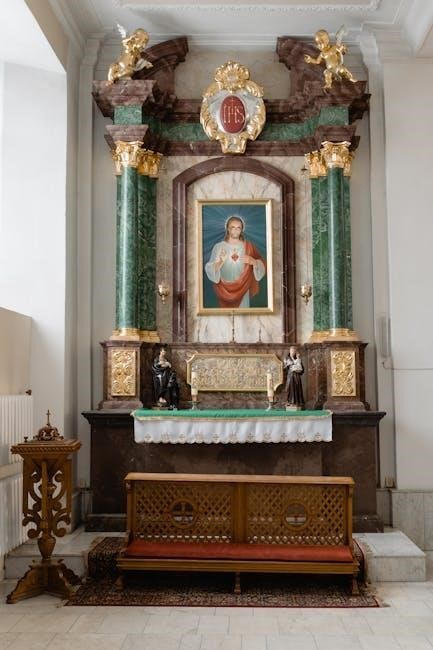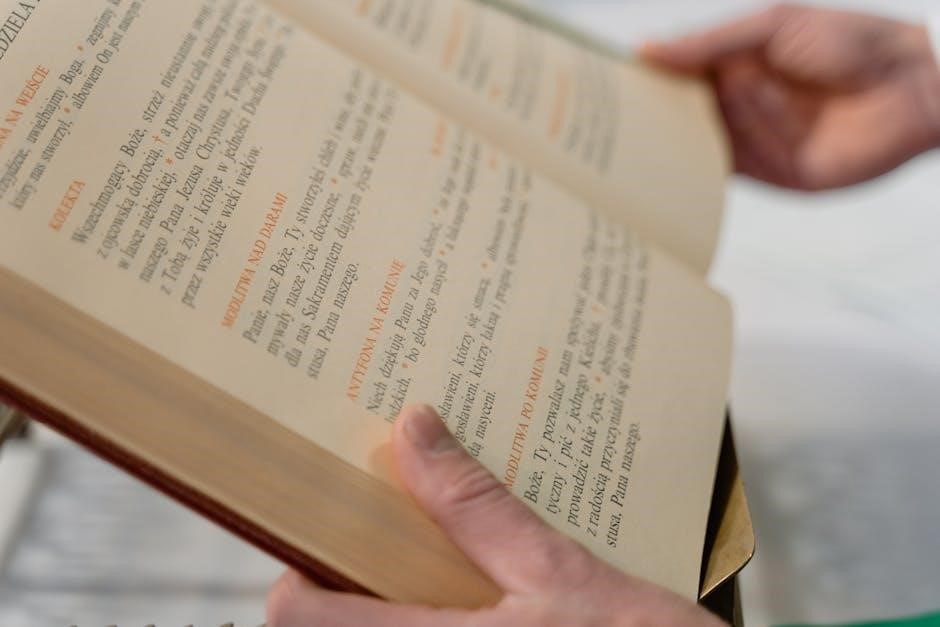Catholic Bible study is a vital practice for deepening faith and understanding God’s Word‚ offering a transformative experience that connects believers with Scripture and Church teachings through comprehensive study guides and resources.
The Importance of Bible Study in Catholic Faith
Bible study holds a central role in the Catholic faith‚ serving as a means to deepen one’s relationship with God and understand His divine plan. Through Scripture‚ Catholics encounter the living Word of God‚ which illuminates the path to salvation and fosters spiritual growth. Regular engagement with the Bible strengthens faith‚ nurtures prayer life‚ and equips believers to live according to Christ’s teachings. It also cultivates a deeper appreciation for the sacraments and the Church’s traditions‚ reinforcing the connection between personal devotion and communal worship. By immersing themselves in God’s Word‚ Catholics are empowered to discern His will and apply biblical truths to their daily lives‚ ultimately growing in holiness and fulfilling their calling as disciples of Christ.
The Holy Spirit guides this journey‚ transforming hearts and minds through the power of Scripture‚ making Bible study an indispensable practice for every Catholic.
Understanding the Catholic Approach to Scripture
The Catholic approach to Scripture is deeply rooted in the belief that the Bible is the inspired Word of God‚ entrusted to the Church for interpretation and guidance; This approach emphasizes the unity of Scripture‚ seeing the Old and New Testaments as a single‚ cohesive narrative of God’s plan for salvation. Catholics rely on the Holy Spirit and the Magisterium (the Church’s teaching authority) to guide their understanding of biblical texts. This method integrates faith and reason‚ ensuring that Scripture is interpreted within the context of Church Tradition and the teachings of the early Church Fathers. By engaging with Scripture in this way‚ Catholics seek to encounter Christ‚ deepen their faith‚ and live out the Gospel in their daily lives.

Study guides and resources‚ such as those by Jeff Cavins and Edward Sri‚ provide structured approaches to understanding Scripture‚ making it accessible for both personal and group study.
Benefits of Engaging in Regular Bible Study
Engaging in regular Catholic Bible study offers numerous spiritual and personal benefits‚ fostering a deeper connection with God and His Word. It enriches faith‚ providing a clearer understanding of Church teachings and their relevance in daily life. Through Scripture‚ believers encounter Christ‚ gaining inspiration and guidance for living out their faith authentically. Bible study also cultivates a sense of community‚ especially in group settings‚ where shared reflections and discussions deepen spiritual bonds. Regular study helps individuals apply biblical teachings to real-life challenges‚ making informed decisions aligned with Catholic values. It also enhances prayer life‚ as Scripture becomes a source of meditation and devotion. Ultimately‚ consistent Bible study transforms lives‚ leading to greater holiness‚ compassion‚ and a vibrant relationship with God.

Key Principles of Catholic Bible Study
Catholic Bible study emphasizes prayer‚ the Holy Spirit’s guidance‚ and understanding Scripture within Catholic Tradition‚ ensuring a faithful and transformative encounter with God’s Word.
The Role of Prayer in Bible Study
Prayer is essential in Catholic Bible study‚ as it invites the Holy Spirit to guide and illuminate the mind and heart. Before studying‚ Catholics are encouraged to pray‚ asking for openness to God’s Word and a deeper understanding of its teachings. This spiritual preparation helps transform Bible study from an academic exercise into a sacred encounter with the living Word of God. Prayer fosters a humble and receptive heart‚ allowing believers to discern the divine message within Scripture. By beginning and ending with prayer‚ Catholics ensure that their study remains rooted in faith and leads to a more intimate relationship with Christ. This practice reflects the Catholic belief that Scripture is not just a book but a means of encountering the Lord.
Understanding the Bible Within Catholic Tradition
Understanding the Bible within Catholic Tradition involves interpreting Scripture in harmony with the Church’s teachings and historical context. Catholics believe the Bible is the Word of God‚ but its meaning is illuminated through the guidance of the Magisterium and the wisdom of the early Church Fathers. Sacred Tradition‚ alongside Scripture‚ forms the foundation of Catholic doctrine‚ ensuring that biblical interpretation remains faithful to the Church’s understanding. This approach emphasizes the unity of Scripture and the continuity of Catholic teaching‚ avoiding isolated or personal interpretations. By studying the Bible within this tradition‚ Catholics can deepen their faith and grasp the richness of God’s revelation‚ recognizing the Bible as a living document that speaks to the heart of the Church’s beliefs and practices.
The Holy Spirit as a Guide in Scripture Study
The Holy Spirit plays a central role in Catholic Bible study‚ guiding believers to a deeper understanding of God’s Word. Catholics are encouraged to begin their study with prayer‚ inviting the Holy Spirit to “open their hearts and minds” to the teachings of Scripture. This spiritual guidance helps readers move beyond a literal interpretation‚ allowing them to encounter the living Word of God. The Holy Spirit illuminates the connection between Scripture and the life of Christ‚ making the Bible a transformative and personal experience. By relying on the Holy Spirit‚ Catholics can approach Scripture with humility and openness‚ fostering a deeper relationship with God and a more profound appreciation of His revelation. This divine guidance ensures that Bible study becomes not just an intellectual exercise but a spiritual encounter that nurtures faith and inspires action.

Methods for Effective Catholic Bible Study
Effective Catholic Bible study begins with prayer‚ inviting the Holy Spirit to guide understanding. Use of study guides‚ personal reflection‚ and group discussions deepen faith and foster spiritual growth.
Personal Study Techniques
Personal Catholic Bible study begins with prayer‚ inviting the Holy Spirit to guide understanding. Use of study guides‚ such as The Catholic Bible Study Handbook or Jeff Cavins’ The Great Adventure‚ provides structured approaches. Start by reading the selected passage slowly‚ reflecting on its meaning and relevance to your life. Consider the historical and cultural context‚ as well as how the passage aligns with Catholic teachings. Take notes to record insights and questions. Many Catholics also benefit from audio resources‚ such as Bible studies by Edward Sri‚ to deepen comprehension. Regular reflection and journaling help integrate biblical truths into daily life‚ fostering spiritual growth and a deeper connection to God’s Word. Consistency is key; even short‚ focused sessions can yield transformative results.
Group Study Dynamics and Benefits
Group Catholic Bible study fosters spiritual growth through shared insights and communal reflection. Participants benefit from diverse perspectives‚ enriching their understanding of Scripture. Resources like study guides from Jeff Cavins and Edward Sri provide structured discussions‚ ensuring depth and clarity. Group dynamics encourage accountability and mutual encouragement‚ helping participants stay committed to their faith journey. Many parishes offer Bible study groups‚ creating a supportive environment for learning and fellowship. Sharing personal reflections and experiences allows members to connect Scripture to real-life situations‚ deepening its relevance. Group study also promotes a sense of community‚ uniting believers in their quest to understand and live out God’s Word. Regular meetings and collaborative learning enhance spiritual engagement‚ making group study a powerful tool for growing in faith and applying Catholic teachings to daily life.

Resources for Catholic Bible Study
Catholic Bible study resources include comprehensive study guides‚ online tools‚ and books by authors like Jeff Cavins and Edward Sri. These materials provide depth‚ fostering spiritual engagement and growth through Scripture.
Recommended Study Guides and Materials
Recommended study guides include The Catholic Bible Study Handbook by Jerome Kodell and Following Jesus: A Disciple’s Guide to Luke and Acts by Fr. William Kurz. These resources provide in-depth insights and structured approaches for personal or group study. Additionally‚ top-quality Catholic Bible studies by Jeff Cavins‚ Edward Sri‚ and others are available‚ offering transformative experiences. Online platforms like Ascension Press provide accessible materials‚ including downloadable guides and audio resources. These tools are designed to deepen faith‚ enhance understanding‚ and foster spiritual growth. They cater to both individuals and groups‚ making Bible study engaging and enriching. Utilizing these resources ensures a comprehensive and meaningful exploration of Scripture within the Catholic tradition.

Utilizing Online Bible Study Tools
Online Bible study tools offer convenient and accessible ways to deepen your faith. Platforms like Ascension Press provide instant access to high-quality studies by renowned authors such as Jeff Cavins and Edward Sri. These resources include downloadable guides‚ audio sessions‚ and video presentations‚ making it easy to engage with Scripture at your own pace. Many websites also offer free Catholic Bible studies for individuals and small groups‚ featuring topics like salvation history and spiritual growth. Additionally‚ online tools often include interactive features‚ such as discussion forums and downloadable worksheets‚ to enhance learning. These digital resources are perfect for those seeking flexibility in their study routine‚ allowing them to explore Scripture anytime and anywhere. They are a valuable complement to traditional study methods‚ fostering a deeper connection with God’s Word in a modern‚ accessible way.
Suggested Books for Deeper Understanding
Several books are highly recommended for a deeper understanding of Catholic Bible study. The Catholic Bible Study Handbook by Jerome Kodell offers practical guidance for both personal and group study‚ while Following Jesus: A Disciple’s Guide to Luke and Acts by Fr. William Kurz provides insightful commentary on key biblical texts. These resources are designed to enhance your study experience‚ offering historical context‚ theological insights‚ and spiritual reflections. They are particularly useful for those seeking to connect Scripture with Catholic teachings and traditions. By incorporating these books into your study routine‚ you can gain a richer understanding of God’s Word and its relevance to your faith journey. These texts are invaluable for fostering spiritual growth and deepening your connection to the Bible.

Practical Steps for a Fruitful Bible Study
Start with prayer‚ prepare with study guides‚ and apply teachings to daily life. Engage with community for deeper understanding and spiritual growth in your Bible study journey.

Choosing the Right Bible Translation
Selecting the right Bible translation is crucial for meaningful Catholic Bible study. The Revised Standard Version‚ Second Catholic Edition (RSV-CE) and the New American Bible‚ Revised Edition (NABRE) are highly recommended for their accuracy and fidelity to Catholic teachings. These translations include the deuterocanonical books‚ essential for understanding the Catholic faith. The Knox Bible and New Jerusalem Bible (NJB) are also popular for their rich theological insights. Consider the language style—some prefer the poetic tone of the King James Version (KJV)‚ while others opt for modern translations like the NIV Catholic Edition. Choose a version that resonates with your spiritual needs and supports your prayerful engagement with Scripture. Always ensure the translation aligns with Catholic doctrine and is approved by the Church for study and devotion.
Preparing for Each Study Session
Preparing for a fruitful Catholic Bible study session involves creating a conducive environment and gathering essential materials. Begin by selecting a quiet‚ distraction-free space where you can focus on Scripture. Ensure you have a Catholic Bible translation‚ such as the RSV-CE or NABRE‚ along with study guides like The Catholic Bible Study Handbook or Following Jesus: A Disciple’s Guide to Luke and Acts. Having a notebook and pen allows you to jot down reflections‚ questions‚ and insights. Pray before starting‚ inviting the Holy Spirit to guide your understanding. Review the selected passage beforehand to familiarize yourself with the context. Engage with online tools or commentaries for deeper analysis. Finally‚ approach the session with an open heart and mind‚ ready to encounter the Word of God. This preparation fosters a meaningful and transformative study experience.
Applying Biblical Teachings to Daily Life
Applying biblical teachings to daily life is a cornerstone of Catholic Bible study‚ enabling believers to live out their faith authentically. Through prayer and reflection‚ Catholics can discern how Scripture applies to their personal circumstances‚ fostering a deeper connection with God. This involves integrating moral teachings‚ such as love‚ forgiveness‚ and service‚ into everyday decisions and interactions. For instance‚ the call to “love your neighbor as yourself” (Matthew 22:39) can inspire acts of kindness and compassion in one’s community. Additionally‚ studying resources like The Catholic Bible Study Handbook or Following Jesus: A Disciple’s Guide to Luke and Acts provides practical insights for living out faith. By applying biblical principles‚ Catholics can transform their lives and become witnesses of Christ’s love in the world‚ fulfilling the Great Commission to “go and make disciples of all nations” (Matthew 28:19).

Engaging the Community in Bible Study
Engaging the community in Bible study strengthens faith through shared learning and fellowship. Participating in parish groups and using study guides fosters spiritual growth and unity among believers.

Participating in Parish Bible Study Groups
Participating in parish Bible study groups offers a supportive environment for spiritual growth and fellowship. These groups provide structured sessions‚ often using study guides and resources‚ to deepen understanding of Scripture. Members benefit from shared insights‚ fostering a sense of community and accountability. Parish groups also encourage applying biblical teachings to daily life‚ promoting a lived faith. Many parishes offer flexible schedules‚ accommodating various needs‚ and some incorporate audio or online materials for convenience. Engaging in these groups not only enriches individual faith but also strengthens the parish community. Sharing reflections and experiences within the group setting enhances learning and encourages others on their spiritual journey. Through active participation‚ believers grow closer to Christ and to one another‚ embodying the Church’s mission of unity and evangelization.
Sharing Insights and Encouraging Others
Sharing insights and encouraging others is a powerful way to foster spiritual growth within the Catholic community. By discussing Scripture and personal reflections‚ individuals can deepen their understanding and inspire one another. This mutual support creates a nurturing environment where faith flourishes. Encouraging others to engage in Bible study helps them connect with God’s Word and strengthens their relationship with Christ. Sharing insights also promotes accountability and motivation‚ as believers learn from each other’s perspectives. Through this collaborative approach‚ the community grows in unity and faith‚ embodying the Church’s mission to spread the Gospel. Encouraging others to participate in Bible study not only enriches their spiritual journey but also builds a stronger‚ more vibrant faith community.
